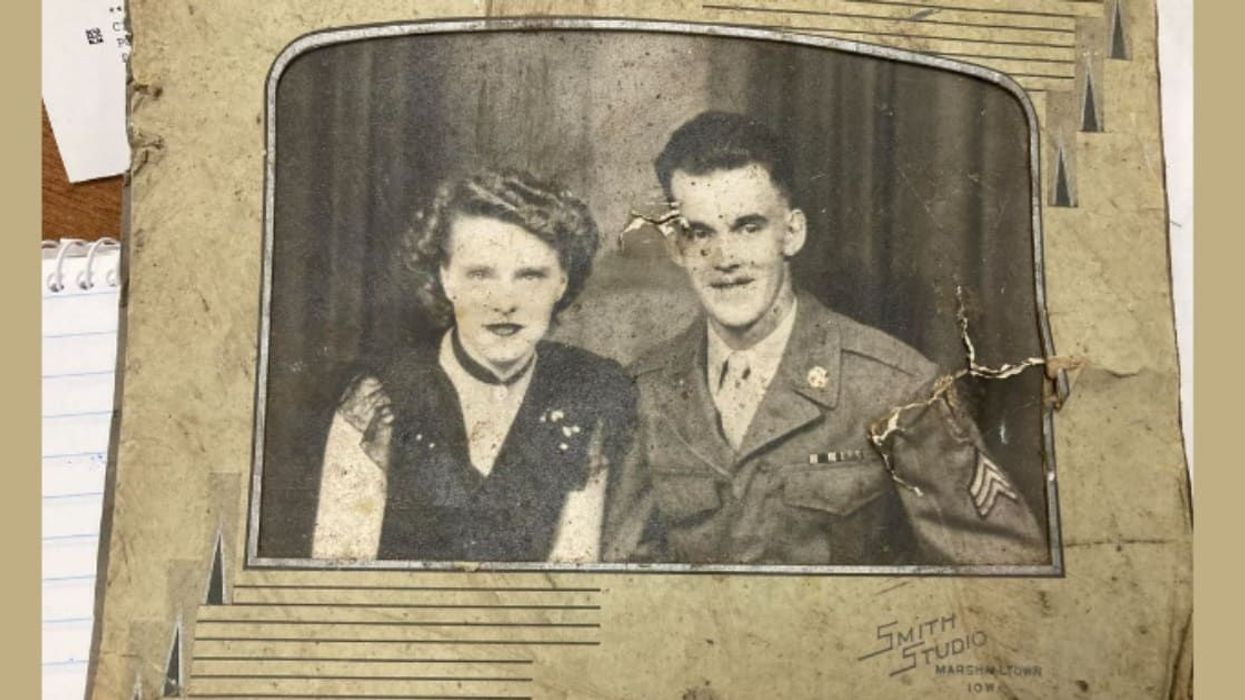In an incredible story of recovering lost treasure, an Iowa woman named Marcie Mull has been able to reunite with a cherished wedding photo that was lost during the devastating tornado that swept through her town nearly 16 years ago. Marcia Mull's daughter, Hope Tomkins, came across a Facebook post from the City of Parkersburg featuring an old wedding photo with two familiar faces—a photo she feared had been lost forever in the aftermath of the destructive tornado. The post read, "Does anyone recognize this couple? One of the many unclaimed tornado items from over the years. Cleaning out the closet at city hall and we found this! Let’s see if we can locate the family of the couple in this photo!"
Tomkins immediately recognized the photo and swiftly replied, "That is my grandpa and grandma!" Moments after finding out about the photo, Mull was contacted, and the lost photograph of her parents was finally returned to her. An emotional Mull expressed the importance of the precious memento as she said, "Oh, it means remembering things from my mom and dad and stuff that we did.” Mull went on to explain the significance of the picture as she pointed out the fact that her father, who was dressed in a military uniform, had fought in World War II and was a vital part of the historic D-Day invasion in Normandy, France—indicating to his utmost bravery and sacrifice.

The tornado, which hit the land on May 25, 2008, with winds clocking to 205 miles per hour, wreaked havoc on the town of Parkersburg and claimed the lives of nine individuals. The tornado left a devasting impact on areas along Highway 14, where homes and residences were torn from their foundations, including Tomkins' residence. Returning to the destructed residence after the storm was heartbreaking for Mull and Tomkins as they lost everything, including the precious wedding photo. However, after 16 years a chance to recover lost treasure may have lessened the pain of the disaster for Marcie Mull and Tomkins.
Parkersburg City Administrator Christopher Luhring, who himself lost a loved one in the 2008 tornado, appreciated the city's efforts to recover thousands of valuable items belonging to residents. The city's latest recovery - Mull's parents' wedding photo is a true example of hope and healing in the aftermath of tragedy, bringing joy and closure to a family who endured unimaginable loss. In a world full of challenges and uncertainty, Mull's reunion with her parents' wedding photo feels like a warm hug that reminds us of the strength of love, resilience, and community. As she holds the wedding photo, it becomes a symbol of hope, healing, and the strong ties that bind families together. For Mull and her family, this reunion will be memorable as it is a reaffirmation of the bonds of love and connection that unite us all, even in the face of life's most daunting challenges. Mull and her family have had the perfect happy ending they had hoped for and could never have imagined.


















 Revenge can feel easier than forgiveness, which often brings sadness or anxiety.
Revenge can feel easier than forgiveness, which often brings sadness or anxiety. 
 In the past two years, two malaria vaccines have become available for babies starting at 5 months of age.
In the past two years, two malaria vaccines have become available for babies starting at 5 months of age. By exploiting vulnerabilities in the malaria parasite’s defense system, researchers hope to develop a treatment that blocks the parasite from entering cells.
By exploiting vulnerabilities in the malaria parasite’s defense system, researchers hope to develop a treatment that blocks the parasite from entering cells. Created with
Created with 

 Volunteers who drive homeless people to shelters talk with a person from Ukraine in Berlin on Jan. 7, 2026.
Volunteers who drive homeless people to shelters talk with a person from Ukraine in Berlin on Jan. 7, 2026.
 Tasks that stretch your brain just beyond its comfort zone, such as knitting and crocheting, can improve cognitive abilities over your lifespan – and doing them in a group setting brings an additional bonus for overall health.
Tasks that stretch your brain just beyond its comfort zone, such as knitting and crocheting, can improve cognitive abilities over your lifespan – and doing them in a group setting brings an additional bonus for overall health. Overdoing any task, whether it be weight training or sitting at the computer for too long, can overtax the muscles as well as the brain.
Overdoing any task, whether it be weight training or sitting at the computer for too long, can overtax the muscles as well as the brain.

 Amoxicillin is a commonly prescribed broad-spectrum antibiotic.
Amoxicillin is a commonly prescribed broad-spectrum antibiotic.  Chart: The Conversation, CC-BY-ND
Chart: The Conversation, CC-BY-ND
 Counterintuitively, social media can make you feel more bored and lonely.
Counterintuitively, social media can make you feel more bored and lonely. Talking about what you’ve read can add a social dimension to what can be a solitary activity.
Talking about what you’ve read can add a social dimension to what can be a solitary activity.